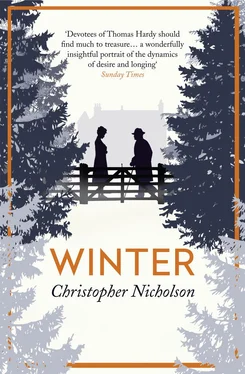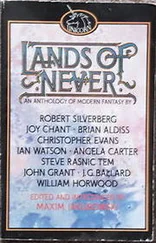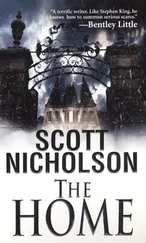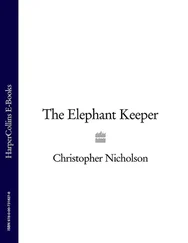My name is Master Prickleback,
And when alarmed I have a knack
Of rolling in a ball
Quite snug and tight, my spines without,
And so if I am pushed about
I suffer not at all.
As I say I was very proud of this poem, which I thought and still think is as good as any of his poems in the book, and I remember that he said that it was very good. However, a year or more after we were married there was a very strange incident when I awoke in the night and heard what I believed to be a baby crying in the garden beneath the window. When the cry came again, I instantly jumped to the conclusion that some servant girl must have left a baby that I should be able to take in and bring up as my own. I had never had this idea before, but now it grew upon me with tremendous force, and I ran through to Thomas, who was asleep, and he rose promptly and together we went to the window. The night was still and warm, with half a moon, but the ground around the trees was all in dark shadow. ‘It is a pleasant night,’ he said, after a time. – ‘I heard it clearly,’ I said, for I thought that he did not believe me; ‘I promise you; I know I heard it. We must search the garden. I am going down. Thomas, I beg you, let us search the garden. I am not imagining it, I assure you. I am sure that there is a baby.’ He hesitated for a moment, and then perceiving my state of anxiety he turned and put on his dressing gown and slippers. Together we went down the stairs. The bolts on the back door sounded very loud as he pulled them back, and Wessie began to bark. I was afraid that he would wake the maids who would think that the house was being burgled and I rushed to let him out. We proceeded into the garden. I was barefoot. The dew was very heavy and silvery blue in the moonlight, and Wessie who was very excited to be out at such an hour raced to and fro. Dogs can smell so well in the dark. I heard the cry again near the vegetable garden; it now had a piteous, mewing quality. ‘There!’ I said. We walked towards it, and found two hedgehogs in the act of congress. Their journey towards each other could be traced by the paths in the dew. Wessie sniffed at them, whereupon they recoiled and curled into their defensive postures. I felt very foolish to have mistaken the cry of a hedgehog for that of a baby, and apologised very much, but he very kindly said that it was an easy enough mistake to make, that the sounds were not that dissimilar and that he might well have made the same mistake himself. Even so, I was so very distressed that it took me hours to get to sleep.
In the morning when we were getting dressed I could see the funnier side of it, and I reminded him of my Master Prickleback poem. ‘We saw Master and Mistress Prickleback,’ I said. To my surprise he claimed not to remember the poem, so I recited it to him. ‘O, yes,’ he said, ‘very good,’ but in a tone that could not have been less complimentary.
‘Thomas,’ I said, ‘it is only a poem for children, you know. It is not pretending to be great literature. Do you think it so very bad? It was meant for children, you know. Children love it.’
He was bending over, tying the laces of one of his shoes. In those days he was still capable of tying his shoe-laces. He said nothing at all, not a word.
‘Please,’ I said, ‘tell me the truth! Do you think it is a bad poem? Is that what you think?’
‘I said that it was very good, if I remember correctly. Did I not?’
‘You did, but your tone seemed to me to indicate the opposite.’
He began to tie the laces of the other shoe. ‘You misinterpret my tone. My opinion is that it serves its purpose admirably.’
He added, as though to soften the blow, that he was sure that children appreciated it, although that was not what I had said, I had said that children love it. There is such a difference between loving something and appreciating it. All the difference in the world! It was clear that he despised the poem, and also that he despised me for writing it. When I say that my entire being felt crushed I am not exaggerating, not at all.
Thus I lost heart. Lacking encouragement, I wrote no more on my own account, and instead I act as his secretary, answering letters, making copies, filing. In addition, I labour (‘labour’ is the word; it is one of the labours of Hercules as I once said to Cockerell) on his biography, using his old notes to piece together the story of his life. I am glad to do so, I do not complain, it is a very sensible arrangement. Who else could do it? All the same, when, as usually happens, he takes my sentences – the sentences over which I have taken so much care – and writes them over in his own creaking style, it is a little galling. It galls me. It is as if he cannot bear to hear the sound of my true voice. After all, I am supposed to be the author of this biography! Is it so surprising that I am a little galled at the way he rewrites my sentences?
I do not complain. Nor do I point out his deficiencies of style. If I dared to do so, I know what would happen: he would not argue or seek to defend himself, but would withdraw into his own fortress. Yet I am not alone: others have commented on his antique vocabulary and his convoluted, Teutonic sentence constructions. Sometimes I think it is as if my husband was a great tree and I stunted from living in his shadow.
Of this much I am sure: that it is not possible for me to write well on my own account until I have recovered my health, and it is not possible for me truly to recover my health until the trees have been cut back. Once they are cut back, I shall feel such a weight lifted off me. But unless and until the trees are attended to I cannot begin to write for myself.
Here I should like to mention my strong belief that the growth on my neck may have been caused, at least in part, by the close proximity of the trees. I believe it is very probable, or if not very probable then at least highly possible, that the invisible spores shed by the trees, countless numbers of which I must inhale each day, play an as yet unknown but significant part in the formation of cancerous growths. Some time ago I asked Dr. Gowring for his opinion on the matter, but Dr. Gowring is next to useless, a country doctor with an inflated reputation, and all he would say, with a supercilious air, and in a decidedly offhand manner which made me feel that I, as a mere woman, should not have dared to give utterance to such a thought, was that there was no scientific evidence to support my thesis about spores. I could barely control my anger. ‘But Dr. Gowring,’ I said, ‘it is possible, is it not?’ With some reluctance, he agreed that it could not be discounted as a possibility.
I naturally put the same question to Mr. Sherren when he came to see me after my operation, and he said that it was a most interesting and original idea. Sensing that he was strongly sympathetic to my thesis, I said that I wished someone would investigate it thoroughly. ‘For,’ I said, ‘if it were true, it would be so valuable.’ He agreed, and said that he would certainly mention it to his colleagues in the medical profession. ‘If only,’ he said, with a sigh, ‘we knew the true causes of things.’ I said to him: ‘I dare say I should persuade my husband to have our trees cut back. We have so many trees crowding round the house, we live in a half-darkness, it is quite sepulchral.’ He smiled. ‘Some day,’ he said, ‘I am sure, we shall have a better understanding of these things.’
In a small way, therefore, I hope that I may have contributed something towards the saving of lives, even if my life in itself counts for so very little.
Unlike my husband, I have no study of my own; I use a corner of the drawing room, where I have a little walnut writing-desk. Entering the room now, with the day’s post – a clutch of letters, and a small parcel, wrapped in string and brown paper – I am frustrated to see wet soot covering not only the hearth but also part of the rug. This is not the first time. The chimneys have not been swept for three years, and the drawing room flue is probably blocked by a jackdaws’ nest, a mess of twigs and straw. One watches the jackdaws carrying twigs into it in the breeding season. The fire never seems to draw well. When I speak to my husband about getting in the sweep, he always prevaricates. ‘Later,’ he says – how often have I heard that word! ‘Later’ should be inscribed on my tombstone, I sometimes think! I have told him that, if we do not have the chimneys swept soon, it will be too late, there will be a fire, and we will all burn alive. I have told him this, but it makes no difference. It is another instance of his obstinacy.
Читать дальше












